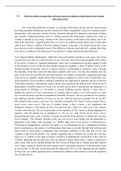Essay
A* wjec english literature exemplar: Justice in King Lear
- Vak
- Instelling
- Boek
A* level exemplar answer to the wjec past paper question, 'How far would you agree that ‘King Lear leaves its audience clearer about what is unjust than what is just'?
[Meer zien]





